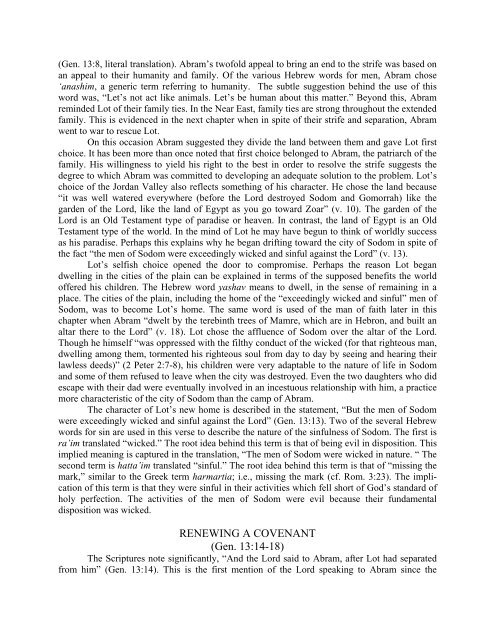A Journey Through The Old Testament - Elmer Towns
A Journey Through The Old Testament - Elmer Towns
A Journey Through The Old Testament - Elmer Towns
You also want an ePaper? Increase the reach of your titles
YUMPU automatically turns print PDFs into web optimized ePapers that Google loves.
(Gen. 13:8, literal translation). Abram’s twofold appeal to bring an end to the strife was based on<br />
an appeal to their humanity and family. Of the various Hebrew words for men, Abram chose<br />
‘anashim, a generic term referring to humanity. <strong>The</strong> subtle suggestion behind the use of this<br />
word was, “Let’s not act like animals. Let’s be human about this matter.” Beyond this, Abram<br />
reminded Lot of their family ties. In the Near East, family ties are strong throughout the extended<br />
family. This is evidenced in the next chapter when in spite of their strife and separation, Abram<br />
went to war to rescue Lot.<br />
On this occasion Abram suggested they divide the land between them and gave Lot first<br />
choice. It has been more than once noted that first choice belonged to Abram, the patriarch of the<br />
family. His willingness to yield his right to the best in order to resolve the strife suggests the<br />
degree to which Abram was committed to developing an adequate solution to the problem. Lot’s<br />
choice of the Jordan Valley also reflects something of his character. He chose the land because<br />
“it was well watered everywhere (before the Lord destroyed Sodom and Gomorrah) like the<br />
garden of the Lord, like the land of Egypt as you go toward Zoar” (v. 10). <strong>The</strong> garden of the<br />
Lord is an <strong>Old</strong> <strong>Testament</strong> type of paradise or heaven. In contrast, the land of Egypt is an <strong>Old</strong><br />
<strong>Testament</strong> type of the world. In the mind of Lot he may have begun to think of worldly success<br />
as his paradise. Perhaps this explains why he began drifting toward the city of Sodom in spite of<br />
the fact “the men of Sodom were exceedingly wicked and sinful against the Lord” (v. 13).<br />
Lot’s selfish choice opened the door to compromise. Perhaps the reason Lot began<br />
dwelling in the cities of the plain can be explained in terms of the supposed benefits the world<br />
offered his children. <strong>The</strong> Hebrew word yashav means to dwell, in the sense of remaining in a<br />
place. <strong>The</strong> cities of the plain, including the home of the “exceedingly wicked and sinful” men of<br />
Sodom, was to become Lot’s home. <strong>The</strong> same word is used of the man of faith later in this<br />
chapter when Abram “dwelt by the terebinth trees of Mamre, which are in Hebron, and built an<br />
altar there to the Lord” (v. 18). Lot chose the affluence of Sodom over the altar of the Lord.<br />
Though he himself “was oppressed with the filthy conduct of the wicked (for that righteous man,<br />
dwelling among them, tormented his righteous soul from day to day by seeing and hearing their<br />
lawless deeds)” (2 Peter 2:7-8), his children were very adaptable to the nature of life in Sodom<br />
and some of them refused to leave when the city was destroyed. Even the two daughters who did<br />
escape with their dad were eventually involved in an incestuous relationship with him, a practice<br />
more characteristic of the city of Sodom than the camp of Abram.<br />
<strong>The</strong> character of Lot’s new home is described in the statement, “But the men of Sodom<br />
were exceedingly wicked and sinful against the Lord” (Gen. 13:13). Two of the several Hebrew<br />
words for sin are used in this verse to describe the nature of the sinfulness of Sodom. <strong>The</strong> first is<br />
ra’im translated “wicked.” <strong>The</strong> root idea behind this term is that of being evil in disposition. This<br />
implied meaning is captured in the translation, “<strong>The</strong> men of Sodom were wicked in nature. “ <strong>The</strong><br />
second term is hatta’im translated “sinful.” <strong>The</strong> root idea behind this term is that of “missing the<br />
mark,” similar to the Greek term harmartia; i.e., missing the mark (cf. Rom. 3:23). <strong>The</strong> implication<br />
of this term is that they were sinful in their activities which fell short of God’s standard of<br />
holy perfection. <strong>The</strong> activities of the men of Sodom were evil because their fundamental<br />
disposition was wicked.<br />
RENEWING A COVENANT<br />
(Gen. 13:14-18)<br />
<strong>The</strong> Scriptures note significantly, “And the Lord said to Abram, after Lot had separated<br />
from him” (Gen. 13:14). This is the first mention of the Lord speaking to Abram since the
















